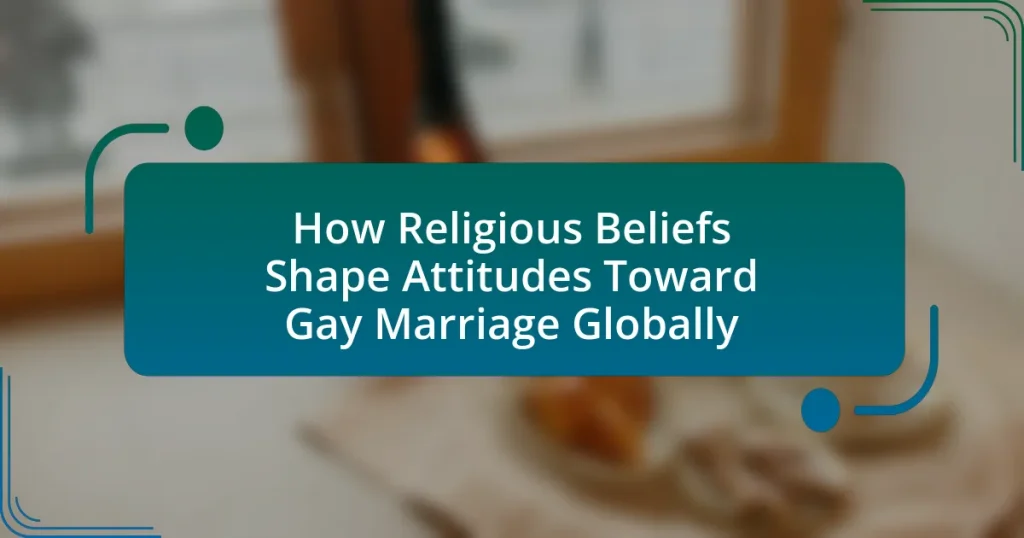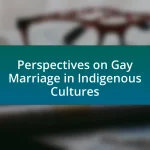The article examines how religious beliefs shape attitudes toward gay marriage across different cultures and regions globally. It highlights the significant opposition to same-sex marriage in predominantly Christian and Islamic societies, where interpretations of sacred texts often reinforce traditional views on marriage. The article also discusses the divergence in attitudes between religious and secular societies, the role of religious leaders in advocating for LGBTQ+ rights, and the impact of interfaith dialogues on promoting acceptance. Additionally, it explores the legal implications of religious beliefs on gay marriage legislation and the strategies advocates can employ to address religious opposition.
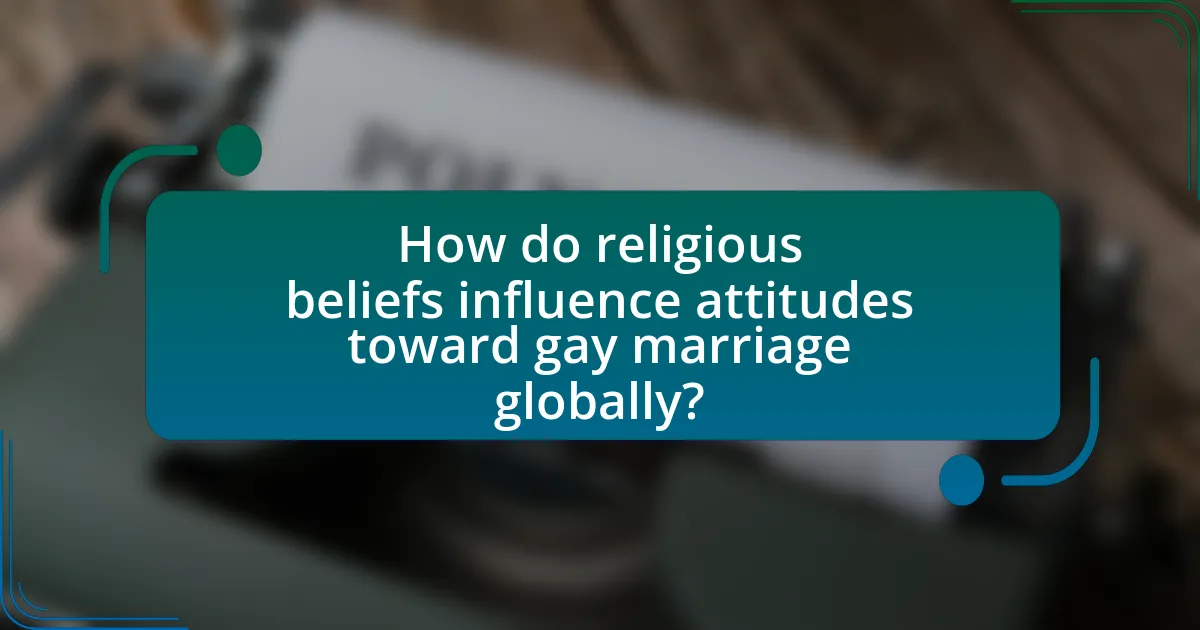
How do religious beliefs influence attitudes toward gay marriage globally?
Religious beliefs significantly influence attitudes toward gay marriage globally, often leading to opposition in many cultures. For instance, in predominantly Christian countries, teachings from the Bible are frequently cited to argue against same-sex marriage, with many denominations viewing it as contrary to their doctrines. In Islamic contexts, similar interpretations of the Quran result in strong resistance to gay marriage, as many Muslims believe it contradicts traditional family values. Surveys, such as the Pew Research Center’s 2020 report, indicate that in regions like the Middle East and Africa, a majority of religious individuals oppose gay marriage, reflecting the deep-rooted influence of faith on social norms. Conversely, in more secular societies or those with liberal religious interpretations, such as parts of Western Europe, acceptance of gay marriage is more prevalent, showcasing a divergence in attitudes shaped by varying religious beliefs.
What are the key religious beliefs that shape perspectives on gay marriage?
Key religious beliefs that shape perspectives on gay marriage include the interpretation of sacred texts, doctrines on marriage, and views on sexuality. For instance, many conservative Christian denominations interpret the Bible as condemning same-sex relationships, leading to opposition against gay marriage. Similarly, Islamic teachings often emphasize traditional marriage between a man and a woman, viewing homosexuality as incompatible with religious principles. In contrast, some progressive religious groups advocate for inclusivity and acceptance, arguing that love and commitment should be celebrated regardless of sexual orientation. These differing interpretations and teachings significantly influence followers’ attitudes toward gay marriage across various faiths.
How do different religions interpret the concept of marriage?
Different religions interpret the concept of marriage as a sacred union with varying significance and practices. In Christianity, marriage is often viewed as a covenant between a man and a woman, reflecting the relationship between Christ and the Church, as stated in Ephesians 5:25-32. In Islam, marriage is considered a contract (nikah) that establishes rights and responsibilities between spouses, emphasizing mutual consent and respect, as outlined in Surah An-Nisa 4:21. Hinduism regards marriage (samskara) as a sacred duty and a lifelong commitment, with rituals that symbolize the spiritual union of two souls, supported by texts like the Manusmriti. Buddhism sees marriage as a social contract rather than a religious obligation, focusing on mutual happiness and respect, as highlighted in the teachings of the Buddha. Each interpretation shapes followers’ views on marriage, including attitudes toward same-sex unions, reflecting broader religious beliefs and cultural contexts.
What role do religious texts play in shaping views on homosexuality?
Religious texts significantly influence views on homosexuality by providing moral frameworks and teachings that shape followers’ beliefs and attitudes. For instance, many Abrahamic religions reference specific passages that condemn homosexual acts, such as Leviticus 18:22 in the Hebrew Bible and Romans 1:26-27 in the New Testament, which have historically been interpreted as prohibitive. These interpretations often lead to the reinforcement of negative attitudes toward homosexuality within religious communities, affecting social norms and legal stances on issues like gay marriage. Additionally, the authority of religious leaders in interpreting these texts can further entrench these views, as seen in various religious organizations that actively oppose LGBTQ+ rights based on scriptural interpretations.
Why do some religious groups oppose gay marriage?
Some religious groups oppose gay marriage due to their interpretation of sacred texts that define marriage as a union between a man and a woman. For instance, many Christian denominations reference passages from the Bible, such as Genesis 2:24, which states that a man shall leave his parents and be joined to his wife, emphasizing heterosexual unions. Additionally, Islamic teachings often uphold traditional marriage definitions, viewing same-sex relationships as contrary to religious doctrine. These interpretations are rooted in long-standing beliefs about family structure and morality, leading to resistance against the legalization of gay marriage in various religious communities.
What theological arguments are presented against gay marriage?
Theological arguments against gay marriage primarily stem from interpretations of sacred texts and traditional doctrines. Many religious groups cite passages from the Bible, such as Leviticus 18:22 and Romans 1:26-27, which they interpret as condemning same-sex relationships. Additionally, some argue that marriage is defined as a union between one man and one woman, a view rooted in Genesis 2:24, which states that a man shall leave his parents and be united with his wife. These interpretations are often reinforced by historical teachings within various faith traditions, which emphasize procreation and the complementary nature of male and female relationships as central to the institution of marriage.
How do cultural contexts affect religious opposition to gay marriage?
Cultural contexts significantly influence religious opposition to gay marriage by shaping the values and beliefs that underpin religious doctrines. In societies where traditional family structures and heterosexual norms are deeply ingrained, religious groups often view gay marriage as a threat to these established norms. For instance, in many conservative cultures, religious texts are interpreted in ways that reinforce opposition to homosexuality, leading to strong resistance against legal recognition of same-sex unions. Research by Pew Research Center indicates that in regions like the Middle East and parts of Africa, where cultural conservatism prevails, a majority of religious individuals oppose gay marriage, reflecting the intersection of cultural and religious beliefs. This opposition is less pronounced in more liberal societies, where cultural acceptance of LGBTQ+ rights has led to a reinterpretation of religious texts and a more inclusive stance among some religious groups.
How do progressive religious movements support gay marriage?
Progressive religious movements support gay marriage by advocating for inclusivity and equality based on interpretations of love and justice found in religious texts. These movements often emphasize the belief that all individuals, regardless of sexual orientation, deserve the same rights and recognition within their faith communities. For instance, organizations like the United Church of Christ and the Episcopal Church have publicly endorsed same-sex marriage, citing theological arguments that promote love and acceptance. Additionally, studies show that religious groups that embrace progressive values tend to have higher levels of support for LGBTQ+ rights, reflecting a shift in traditional interpretations of scripture towards a more inclusive understanding of human dignity.
What changes in interpretation have occurred within certain faiths?
Certain faiths have experienced significant changes in interpretation regarding LGBTQ+ issues, particularly gay marriage. For instance, some denominations within Christianity, such as the United Church of Christ and the Episcopal Church, have shifted towards a more inclusive stance, allowing same-sex marriages and affirming LGBTQ+ identities. This change is often supported by reinterpretations of biblical texts that emphasize love and acceptance over traditional views of sexuality. Additionally, within Judaism, movements like Reform and Reconstructionist Judaism have embraced same-sex marriage, citing evolving understandings of justice and equality as central tenets of their faith. These shifts reflect broader societal changes and a growing recognition of LGBTQ+ rights, demonstrating that religious interpretations can evolve in response to contemporary moral and ethical considerations.
How do religious leaders advocate for LGBTQ+ rights?
Religious leaders advocate for LGBTQ+ rights by promoting inclusivity and acceptance within their faith communities. Many leaders emphasize the importance of love, compassion, and justice, aligning these values with the support for LGBTQ+ individuals. For instance, some denominations, such as the United Church of Christ and the Episcopal Church, have publicly endorsed same-sex marriage and LGBTQ+ rights, citing theological interpretations that affirm the dignity of all people. Additionally, religious leaders often participate in advocacy efforts, such as interfaith dialogues and public demonstrations, to raise awareness and challenge discriminatory practices. This advocacy is supported by research indicating that religious communities can play a significant role in shaping societal attitudes toward LGBTQ+ issues, as seen in studies conducted by organizations like the Pew Research Center, which highlight the evolving perspectives within various faith traditions.
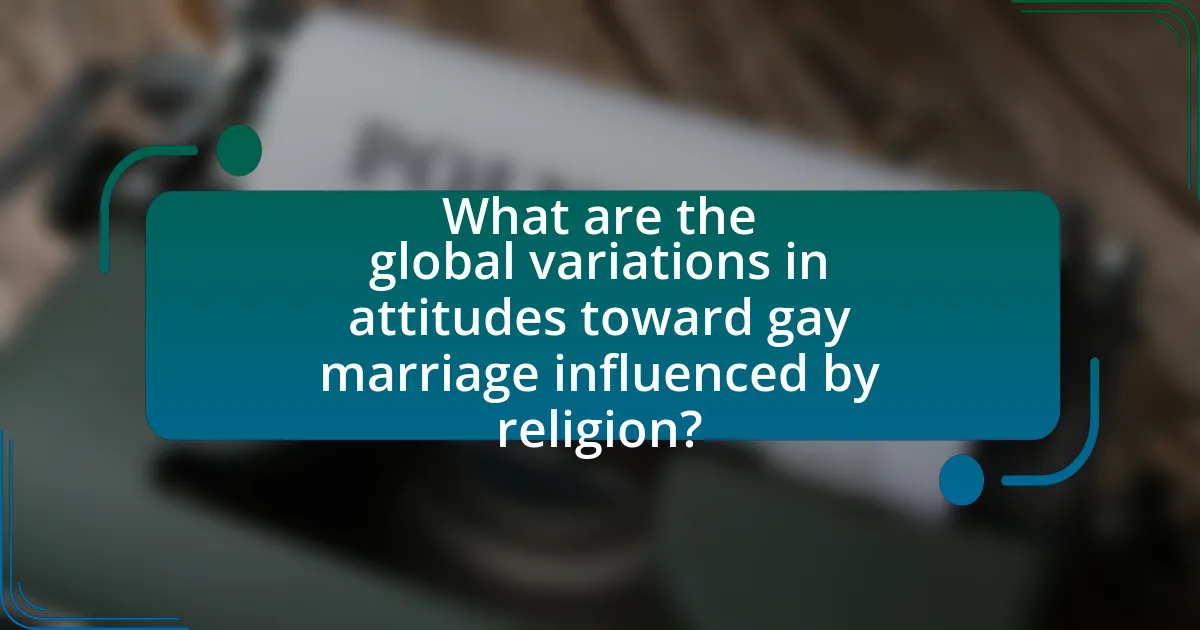
What are the global variations in attitudes toward gay marriage influenced by religion?
Global variations in attitudes toward gay marriage are significantly influenced by religious beliefs, with acceptance levels differing widely across regions. In predominantly Christian countries, such as the United States and parts of Western Europe, there has been a growing acceptance of gay marriage, particularly among more liberal denominations. Conversely, in regions with strong Islamic influence, such as the Middle East and North Africa, attitudes remain largely negative, with many countries enforcing laws against same-sex marriage based on religious doctrine. For instance, a Pew Research Center survey from 2020 indicated that 70% of Christians in the U.S. support gay marriage, while in countries like Egypt and Saudi Arabia, support is below 5%. This illustrates how religious teachings and cultural contexts shape public opinion on gay marriage globally.
How do attitudes differ between predominantly religious and secular countries?
Attitudes toward gay marriage significantly differ between predominantly religious and secular countries, with religious nations generally exhibiting more opposition. For instance, a 2021 Pew Research Center study found that in countries like the United States, where religious beliefs are more influential, support for gay marriage is lower compared to secular nations such as Sweden, where over 80% of the population supports it. This disparity is often rooted in the moral frameworks provided by religious doctrines, which typically emphasize traditional views on marriage, contrasting with secular perspectives that prioritize individual rights and equality.
What examples illustrate the contrast in attitudes across different regions?
Countries like the United States and Canada exhibit more progressive attitudes toward gay marriage, largely influenced by secular values and a growing acceptance of LGBTQ+ rights, while regions such as the Middle East and parts of Africa maintain conservative stances rooted in religious beliefs that oppose same-sex unions. For instance, the U.S. Supreme Court legalized gay marriage nationwide in 2015, reflecting a significant shift in public opinion, whereas countries like Saudi Arabia enforce strict laws against homosexuality, often resulting in severe penalties. This contrast highlights how cultural and religious contexts shape societal attitudes toward gay marriage globally.
How do local religious practices influence national policies on gay marriage?
Local religious practices significantly influence national policies on gay marriage by shaping societal attitudes and political discourse. In many countries, religious beliefs dictate moral frameworks that oppose or support LGBTQ+ rights, impacting lawmakers’ decisions. For instance, in the United States, evangelical Christian groups have mobilized against gay marriage, leading to state-level bans and influencing national debates. Conversely, in nations with more progressive religious communities, such as certain branches of Judaism and Unitarian Universalism, local practices have fostered acceptance, contributing to the legalization of gay marriage. This dynamic illustrates how localized religious ideologies can translate into broader legislative outcomes, reflecting the intersection of faith and policy.
What impact do interfaith dialogues have on attitudes toward gay marriage?
Interfaith dialogues positively impact attitudes toward gay marriage by fostering understanding and reducing prejudice among diverse religious groups. Research indicates that these dialogues create spaces for individuals to share personal stories and experiences, which can challenge existing stereotypes and promote empathy. For instance, a study published in the Journal of Homosexuality found that participants who engaged in interfaith discussions reported more favorable attitudes toward LGBTQ+ rights, including gay marriage, compared to those who did not participate in such dialogues. This shift in perspective is often attributed to the exposure to differing viewpoints and the emphasis on shared values of love and acceptance within various faith traditions.
How do collaborative efforts among different faiths promote acceptance?
Collaborative efforts among different faiths promote acceptance by fostering dialogue and understanding among diverse communities. These interfaith initiatives often involve joint activities, such as community service projects or educational programs, which encourage participants to share their beliefs and values. For instance, the Interfaith Youth Core has successfully engaged young people from various religious backgrounds in service projects, leading to increased mutual respect and reduced prejudice. Research indicates that such collaborative efforts can significantly decrease stereotypes and enhance social cohesion, as seen in studies conducted by the Pew Research Center, which highlight the positive impact of interfaith dialogue on community relations.
What role do religious leaders play in fostering interfaith understanding?
Religious leaders play a crucial role in fostering interfaith understanding by promoting dialogue and collaboration among different faith communities. They often serve as mediators, facilitating discussions that encourage respect and appreciation for diverse beliefs. For instance, initiatives like the Parliament of the World’s Religions bring together leaders from various faiths to address global issues, demonstrating the effectiveness of interfaith cooperation. Additionally, religious leaders can influence their congregations by advocating for tolerance and shared values, which can lead to reduced prejudice and increased social harmony.
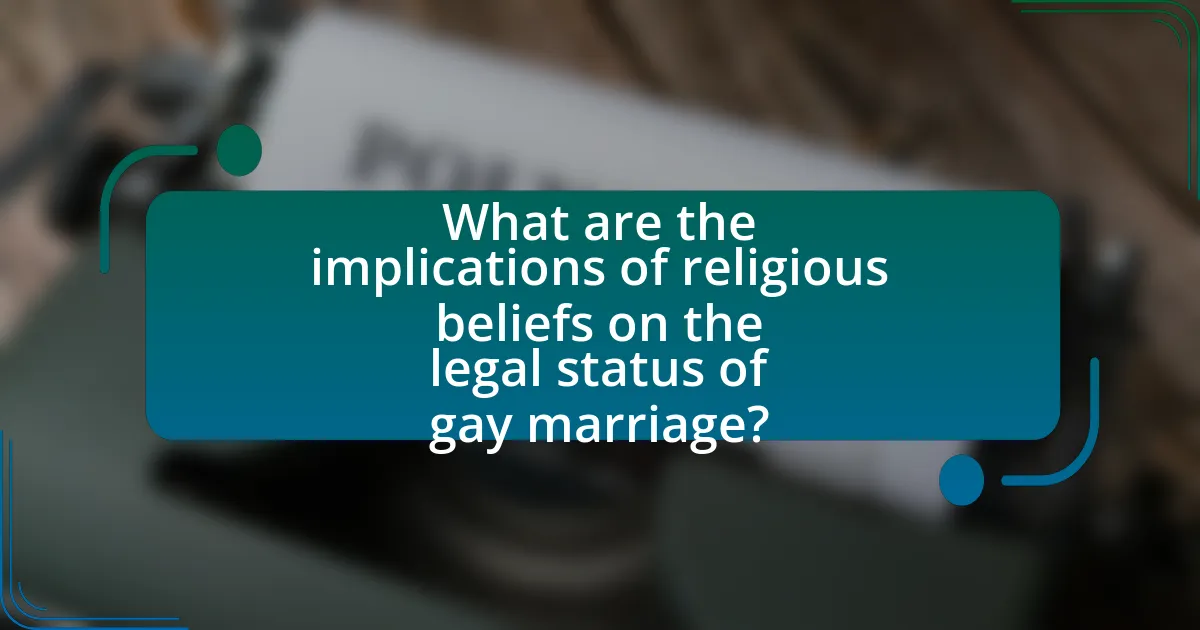
What are the implications of religious beliefs on the legal status of gay marriage?
Religious beliefs significantly influence the legal status of gay marriage, often leading to opposition or support based on doctrinal teachings. For instance, many conservative religious groups, such as certain branches of Christianity and Islam, view same-sex marriage as contrary to their sacred texts, which can result in legal restrictions or bans on gay marriage in various jurisdictions. In contrast, more progressive religious communities may advocate for LGBTQ+ rights, contributing to legal recognition of gay marriage in regions where such beliefs are prevalent. This dichotomy illustrates how religious doctrines can shape public policy and legal frameworks, as seen in countries like the United States, where legal battles over gay marriage often reflect underlying religious convictions.
How do religious beliefs affect legislation regarding gay marriage?
Religious beliefs significantly influence legislation regarding gay marriage by shaping societal norms and political agendas. In many countries, religious institutions advocate for traditional definitions of marriage, often leading to laws that restrict or ban same-sex unions. For instance, in the United States, various religious groups, particularly conservative Christian organizations, have actively campaigned against gay marriage, resulting in state-level bans and constitutional amendments in several jurisdictions until the Supreme Court’s ruling in Obergefell v. Hodges in 2015 legalized it nationwide. Additionally, in countries like Uganda and Nigeria, strong religious opposition has led to the enactment of harsh anti-LGBTQ+ laws, reflecting the power of religious beliefs in shaping legal frameworks.
What are the legal outcomes in countries with strong religious opposition?
Countries with strong religious opposition often enact laws that prohibit or severely restrict same-sex marriage and related rights. For instance, in nations like Saudi Arabia and Iran, homosexuality is criminalized, leading to severe penalties, including imprisonment or even death. In the United States, certain states with strong religious conservatism have passed laws that allow for discrimination against LGBTQ+ individuals under the guise of religious freedom. These legal frameworks reflect the influence of religious beliefs on legislative processes, resulting in significant barriers to marriage equality and LGBTQ+ rights.
How have religious groups influenced court decisions on gay marriage?
Religious groups have significantly influenced court decisions on gay marriage by advocating for traditional definitions of marriage based on their beliefs. For instance, in the United States, organizations such as the National Organization for Marriage and various religious coalitions actively campaigned against same-sex marriage, arguing that it undermines the sanctity of marriage as defined by religious doctrine. Their efforts included lobbying state legislatures and supporting ballot initiatives to define marriage as a union between one man and one woman, which impacted legal frameworks and public opinion. Additionally, religious arguments were presented in court cases, such as in the 2015 Supreme Court case Obergefell v. Hodges, where dissenting opinions referenced religious beliefs to argue against the legalization of same-sex marriage. This illustrates how religious groups have shaped legal discourse and influenced judicial outcomes regarding gay marriage.
What strategies can advocates use to address religious opposition to gay marriage?
Advocates can address religious opposition to gay marriage by promoting dialogue and understanding between religious communities and LGBTQ+ individuals. Engaging in respectful conversations can help dispel myths and foster empathy, as evidenced by initiatives like the “Faith and Equality” project, which encourages interfaith discussions and highlights shared values of love and acceptance. Additionally, advocates can leverage legal frameworks that protect LGBTQ+ rights while respecting religious freedoms, as seen in countries where civil unions are recognized alongside religious marriage. These strategies aim to create a more inclusive environment that respects both religious beliefs and the rights of LGBTQ+ individuals.
How can education and dialogue reduce tensions between religious beliefs and LGBTQ+ rights?
Education and dialogue can reduce tensions between religious beliefs and LGBTQ+ rights by fostering understanding and empathy among differing viewpoints. Educational initiatives that include comprehensive LGBTQ+ history and rights can challenge stereotypes and misinformation prevalent in some religious communities. For instance, studies have shown that exposure to LGBTQ+ individuals and their experiences can lead to more accepting attitudes, as evidenced by research from the Williams Institute, which found that individuals who know someone who identifies as LGBTQ+ are more likely to support LGBTQ+ rights. Dialogue, particularly in interfaith settings, allows for the exploration of common values such as love, compassion, and justice, which can bridge divides. Engaging religious leaders in discussions about inclusivity can also promote reinterpretation of sacred texts in ways that affirm LGBTQ+ identities, thereby reducing conflict and fostering a more harmonious coexistence.
What best practices can be implemented to promote inclusivity in religious communities?
To promote inclusivity in religious communities, best practices include fostering open dialogue, implementing inclusive policies, and providing education on diversity. Open dialogue encourages members to share their experiences and perspectives, which can lead to greater understanding and acceptance. Inclusive policies, such as welcoming LGBTQ+ individuals into leadership roles and affirming their rights, create a supportive environment. Education on diversity, including workshops and discussions about different sexual orientations and gender identities, helps dismantle stereotypes and fosters empathy. Research indicates that communities that actively engage in these practices report higher levels of acceptance and belonging among marginalized groups, thereby enhancing overall community cohesion.
